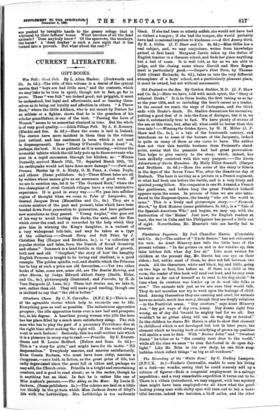CURRENT LITERATURE.
GIFT-BOOKS.
Wee Folk : Good Folk. By L. Allen Harker. (Duckworth and Co. 3s. 6d.)—The title of this volume is a denial of the cynical maxim that "boys are bad little men," and the contents, which we may take to be true in spirit, though not in fact, go far to prove. These "wee folk" are indeed good; not priggish, it must be understood, but loyal and affectionate, and so bearing them- selves ai to.bring out loyalty and affection in others. "A Throw Back," where the little Addison, who is not meant by Nature for an athlete or a fighter, shows that he is the grandson of his scholar grandfather, is one of the best. "Passing the Love of Women" seems to us somewhat strained in tone. But the whole is of very good quality.—Little Village Folk. By A. B. Romney. (Blackie and Son. 25. 6d.)—Here the scene is laid in Ireland. The stories have more incident in them than in the volume just noticed, and less sentiment (a term which is not used in disparagement). Here " Dinny O'Farrell's Great Aunt" is, perhaps, the best. It is as pathetic as it is amusing,— witness the memorial tablets which the old lady puts up to those servants who pass in a rapid succession through her kitchen, as : "Minnie Donnelly, arrived March 17th, '72; departed March 29th, '72. An earthquake would not have done more damage."—Peril and Prowess. Stories by G. A. Henty, G. M. Fenn, A. Conan Doyle, and othera (Same publishers. 6s.)—These fifteen tales are all by writers whose names give us an assurance of good work. If we are to mention one, let it be "The Gurnard Rock," where the two champions of rival Cornish villages have a very instructive experience. It is good in every way.—We pass into anther region of thought when we come to Tales of Languedoc, by Samuel Jacques Brun (Macmillan and Co., 6s.) They are a curious mixture of the past and present, tales which have been handed down froui generation to generation, and have gathered new accretions as they passed. "Young Angles," who goes out of his way to avoid hurting the ducks, the ants, and the flies which cover the road, and is rewarded by the help which they give him in winning the King's daughter, is a variant of a very widespread folk-tale, and may be taken as a type of the collection.—Danish . Fairy and Folk Tales; by J. Christian bay (Harper and Brothers, 5s.), is "a collection of popular stories and tales, from the Danish of Svend Gruntvig and others." Denmark is a land fertile in this kind of growth, both new and old. " Greyfoot," the story of how the haughty English Princess is taught to be loving and obedient, is a good example. The golden spindle, reel, and shuttle which the Princess has to buy at such a price are old favourites.—Yet two other books of tales, some new, some old, are The Scarlet Herring, and other Stories, by Judge Edward Abbott Parry (Smith, Elder, and Co., 6s.), picturesquely illustrated ; and Pierrette, by H. de Vere Stacpoole (J'. Lane, 6s.) These last stories are, we take it, new, rather than old. They will make good reading, though one
is inclined te say that "the old is better." •






















































 Previous page
Previous page